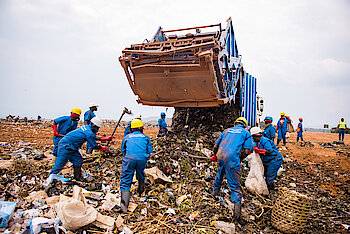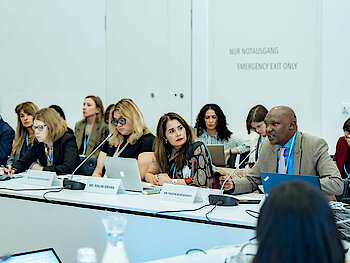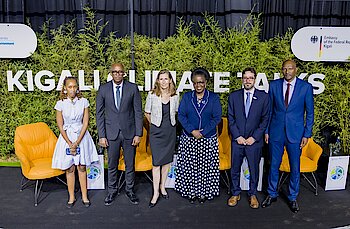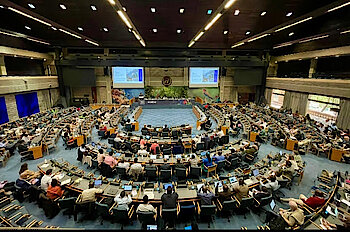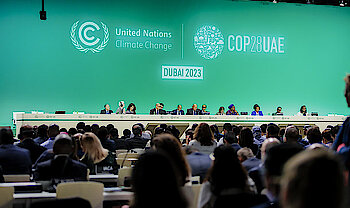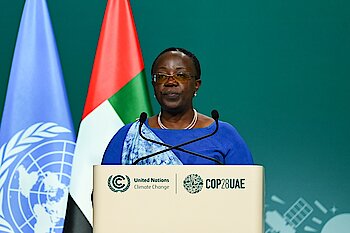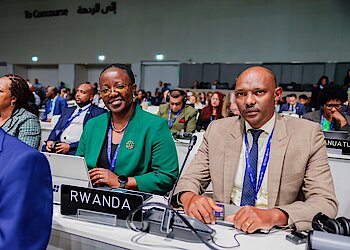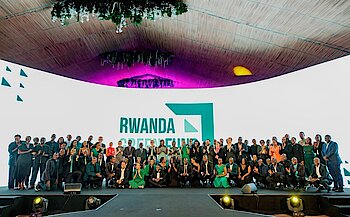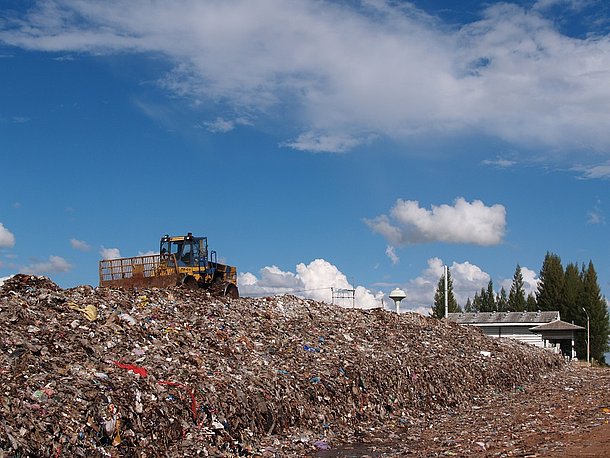
Why mitigating methane emissions is urgent now?
As methane emissions continue to increase, there are more reasons than ever to reduce methane emissions. Reducing human caused methane emissions is one of the fastest, most effective strategies to reduce the rate of warming and contribute to global efforts to limit temperature rise to 1.5C
A recent assessment from United Nations Environment Programme (UNEP) and the Climate and Clean Air Coalition found that cutting methane emissions would be a quick win to fight against climate change.
Methane is one of several greenhouse gases, which trap the sun’s heat in the atmosphere and thus cause the global average temperature to rise. Accounting for about 20% of global emissions, methane is the second most prevalent greenhouse gas after carbon dioxide, which makes up more than 70%.
Methane is many times more powerful than carbon dioxide at trapping heat. However, it breaks down much more quickly: methane is mostly removed from the atmosphere after a decade, while carbon dioxide can contribute to global warming for hundreds of years.
What are the sources of Methane emissions?
Agriculture is the main sources of methane emissions. Mainly, the livestock through enteric fermentation and manure management are the predominant source of emissions. Population growth have stimulated those emissions because of economic development and urban migration have stimulated unprecedented demand for animal protein.
The landfill also produce methane emissions when the municipal solid waste is deposited into landfill. It undergoes an aerobic (with oxygen) decomposition stage when methane is generated. Within less than one year, anaerobic conditions are established and methane producing bacteria being to decompose the waste and generate methane.
In addition, the paddy rice cultivation in which flooded fields prevent oxygen from penetrating the soil, creating ideal conditions for methane emitting bacteria accounts for another 8 % of human-linked emissions.
What are the contribution can we accomplish, if we reduce methane emissions?
It is highly important to note that, cutting methane emissions have many immediate co-benefits. In fact, reducing the methane emissions is quickly doable than implementing carbon dioxides reduction technologies such as carbon capture and storage.
The methane emissions are quickly broken from atmosphere; this means that if we put more efforts in cutting methane emissions, we can reach Paris agreement as soon as we aim, than carbon dioxide, which took a century to be broken from atmosphere.
Cutting methane emissions bring various co-benefits such as increase of food supplies, energy security, and health benefits, because the technologies to reduce those emissions bring those advantages. The actions to mitigate methane emissions include the providing animal with more nutritious feed so that they are larger, healthier and more productive, effectively producing more with less. Also famers can reduce methane by managing manure more efficiently by covering it, composting it, or using it to produce biogas.
When it comes on rice paddle, it was recommended to use alternate wetting and drying approaches that can halve emissions. Rather than allowing the continuous flooding of fields, paddies could be irrigated and drained two to three times throughout the growing season, limiting methane production without impacting yield. This process would also require on-third less water, making it more economical.
Other actions regard the emission reduction from landfills, by constructing managed landfills and produce the energy from landfill gas utilization.
Methane emissions in Rwanda
The methane emission have the high share of 65.3 % and its main predominant source is agriculture especially from the livestock emission such as the enteric fermentation and manure management. This is linked with the population growth, economic development and urban migration, which have increased the animal protein demand.
Topics
More posts
Rwanda to embark the development of Short-Lived Climate Pollutants Plan
Image: Nduba Landfill in Kigali City, (The landfll is known as one source of methane gas which is the greenhouse gas and the short lived pollutants);…
RWANDA’S NEGOTIATORS ARE IN BONN PUSHING FOR CLIMATE FINANCE
Rwanda’s negotiators led by Mr. Faustin Munyazikwiye – Deputy Director General of the Rwanda Environment Management Authority (REMA) – are in Bonn,…
Rwanda and Germany launch the “Kigali Climate Talks”
On 9 May 2024, Dr Jeanne d’Arc Mujawamariya, Rwanda’s Minister of Environment, and Heike Uta Dettmann, Ambassador of the Federal Republic of Germany,…
Tackling Short-Lived Climate Pollutants: Insights from CCAC2024 Conference
The Climate and Clean Air Conference 2024 (CCAC2024), took place in Nairobi, Kenya, on the sidelines of the Sixth session of the United Nations…
RWANDA WELCOMES HISTORIC COP28 DECISION TO TRANSITION AWAY FROM FOSSIL FUELS
The Government of Rwanda has welcomed the ground-breaking decision made at the 28th Conference of the Parties (COP28) to the United Nations Framework…
NATIONAL STATEMENT - COP28 UN CLIMATE CHANGE CONFERENCE
Delivered by Dr Jeanne d’Arc Mujawamariya, Minister of Environment
To begin, I express my gratitude to His Highness Sheikh Mohamed bin Zayed…
Follow the UNEP Pavilion Discussion on the Role of Industry & Finance in Supporting the Adaptation Agenda at COP28
This session, which comes at the conclusion of Industry Day is designed to offer comprehensive insights into the roles of industry and finance in…
Rwanda to call for more ambitious climate action at COP28
At this year’s UN Climate Change Conference, known as COP28, Rwanda will call for more ambitious climate action, a doubling of funding for adaptation…
Rwanda Green Fund Celebrates a Decade of Impact
The Rwanda Green Fund has marked its 10th anniversary, a remarkable milestone of transformative impact in Rwanda. Established in 2012, the Fund has…
